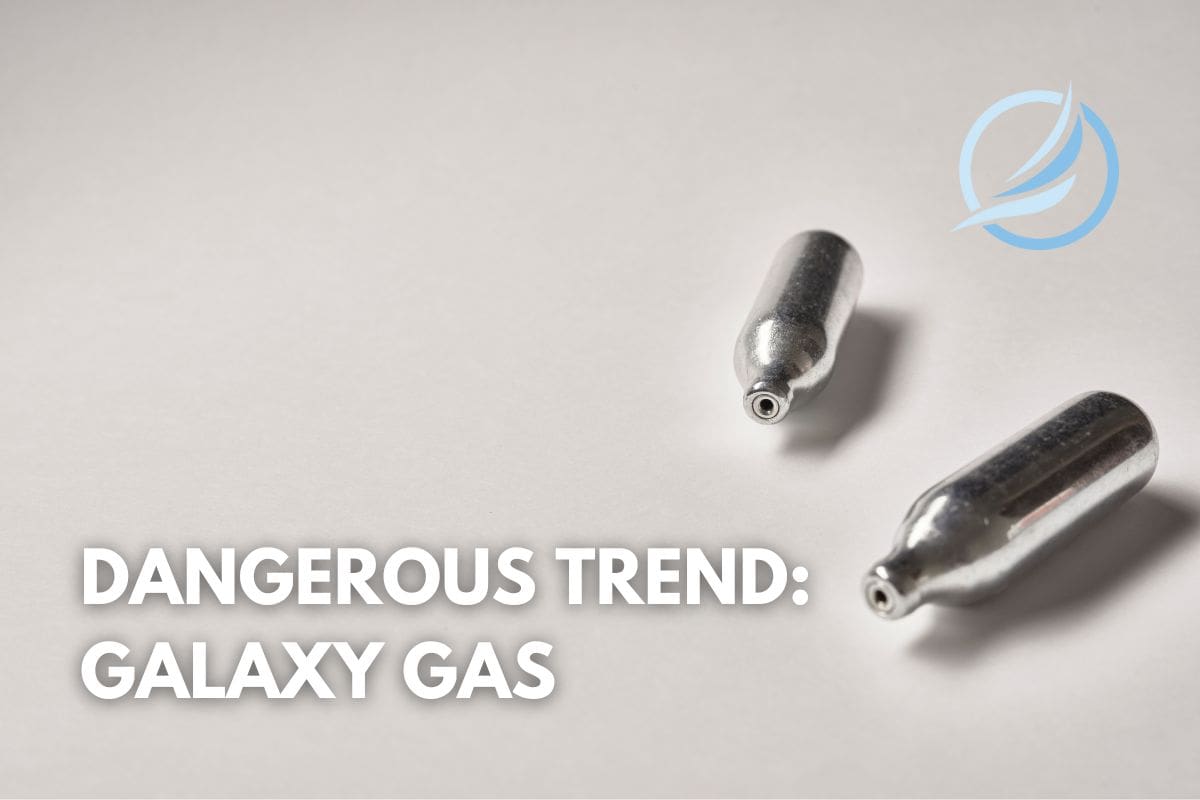In recent years, a disturbing trend known as “Galaxy Gas” has emerged, primarily among teens and young adults. This new form of substance abuse involves inhaling nitrous oxide, often referred to as “laughing gas,” for its temporary euphoric effects. However, what seems like a harmless activity can have severe, life-threatening consequences.
What is Galaxy Gas?
Galaxy Gas is the recreational inhalation of nitrous oxide, commonly known as “laughing gas.” Its popularity has surged alongside its increased visibility on platforms like TikTok and Instagram, where young people experiment with the substance and encourage others to do the same.
Although nitrous oxide has legitimate medical uses, such as in dental anesthesia, it is now being misused recreationally. The gas is commonly found in whipped cream chargers, often called “whippits” or “nangs.” These small canisters, designed to pressurize whipped cream, contain concentrated nitrous oxide, which users inhale for a brief but intense high.
The effects, including euphoria, laughter and mild hallucinations, typically last only a few minutes.
Why is Galaxy Gas Dangerous?
The recreational use of Galaxy Gas (nitrous oxide) may seem harmless at first, but it poses serious short- and long-term health risks:
- Oxygen Deprivation (Hypoxia): Nitrous oxide displaces oxygen in the lungs, reducing the oxygen supply to the brain. This can cause dizziness, confusion, loss of consciousness, or, in extreme cases, death.
- Impaired Motor Control: Nitrous oxide impairs coordination and reaction time, which can result in accidents, falls or injuries while under the influence.
- Nerve Damage (Peripheral Neuropathy): Frequent use depletes vitamin B12, essential for nerve health, leading to numbness, tingling in the limbs and long-term nerve damage.
- Cognitive Impairment: Chronic use of nitrous oxide can affect memory, concentration, and overall cognitive function, potentially causing lasting mental health issues.
- Increased Risk when Mixing with Other Substances: When combined with alcohol or other drugs, nitrous oxide amplifies the depressant effects on the central nervous system, significantly increasing the risk of respiratory failure, blackouts and potentially fatal overdoses.
- Potential for Addiction: Though nitrous oxide isn’t traditionally considered physically addictive, the psychological dependency it creates can be powerful, leading users to seek it out repeatedly for its brief euphoric effects.
How Galaxy Gas Compares to Other Inhalants
Inhalants, a broad category of substances that can be abused through inhalation, include household products like glue, paint thinners and aerosol sprays. Here’s how Galaxy Gas “tricks” users into believing it’s a safer option and why those perceptions are misleading:
- It’s Often Thought Of As Less Dangerous. Nitrous oxide has a false image of perceived safety due to its legitimate medical uses in dentistry and surgery. However, in recreational settings, it can cause severe health risks.
- It’s Easier To Get. Unlike other inhalants, which are typically restricted or harder to obtain, nitrous oxide is readily available as whipped cream chargers. This ease of access makes it more appealing to young people.
- It Feels Less Intense. Galaxy Gas’s high is short-lived, often lasting just a few minutes. This can make it seem safer compared to other inhalants’ longer, more intense effects. However, this brief euphoria usually leads users to inhale more in a short period, increasing the risk of hypoxia (oxygen deprivation) or even death.
- It’s Seen As “Cleaner” Than Other Inhalants. While inhaling glue or paint thinner might seem dirty or dangerous, nitrous oxide is often considered a cleaner, more sophisticated substance.
- It’s Portrayed As More “Social.” Many see nitrous oxide as a party drug, often shared in social settings or at festivals. This gives it a false air of safety and fun, but in reality, using it repeatedly or in combination with other substances can lead to dangerous outcomes.
Signs of Galaxy Gas Abuse
Recognizing the signs of Galaxy Gas abuse is crucial for parents, educators and friends who may be concerned about a young person’s behavior. Since nitrous oxide use can be easy to conceal, it’s important to be aware of both physical and behavioral changes that might indicate misuse:
- Frequent Lightheadedness Or Dizziness. Nitrous oxide’s immediate effect is dizziness caused by the lack of oxygen reaching the brain. If someone often feels lightheaded or appears unsteady, it may be a red flag.
- Unexplained Euphoria Or Giggling. Nitrous oxide can cause bursts of uncontrollable laughter, which may seem out of place in a normal setting. If a person appears euphoric or starts laughing for no apparent reason, especially after stepping away or being in private, it could be a sign of inhalant use.
- Presence Of Whipped Cream Chargers Or Balloons. Galaxy Gas typically involves whipped cream canisters or balloons to hold the gas before it’s inhaled. Finding these items, especially in unusual quantities, may indicate nitrous oxide misuse.
- Numbness Or Tingling In Extremities. Repeated use of nitrous oxide can lead to a depletion of vitamin B12, which in turn causes nerve damage. If someone frequently complains of numbness or tingling in their hands or feet, it could be a sign of long-term abuse.
- Unsteady Walking Or Loss Of Coordination. Inhalants like nitrous oxide affect motor skills, leading to noticeable unsteadiness or clumsiness. Someone who uses Galaxy Gas may appear off-balance or have difficulty walking in a straight line, even when they haven’t been drinking alcohol.
- Secrecy Or Changes In Behavior. People who use inhalants often become more secretive, especially if they are trying to hide their substance use. You might notice them making excuses to leave suddenly, isolating themselves from friends and family, or avoiding responsibilities.
- Rapid Mood Swings. Once the effects of nitrous oxide wear off, they cause quick mood changes, from euphoria to irritability or depression. If someone is experiencing sudden and extreme shifts in their mood or seems unusually anxious, it could be a sign of nitrous oxide use.
Long-Term Effects of Galaxy Gas Use
While Galaxy Gas’s immediate effects might seem temporary, repeated use can lead to significant long-term health consequences. These effects can impact both the body and the mind, and prolonged use increases the severity of these risks:
- Neurological Damage. Nitrous oxide depletes the body’s stores of vitamin B12, essential for maintaining healthy nerves. Over time, this can lead to peripheral neuropathy, a condition characterized by tingling, numbness and even paralysis in the extremities.
- Memory Loss and Cognitive Impairment. Chronic use of nitrous oxide can impair cognitive functions, leading to issues with memory, attention, and problem-solving skills. Users might struggle to concentrate, recall important information or follow conversations.
- Weakened Immune System. Prolonged nitrous oxide abuse can also weaken the immune system, making users more vulnerable to infections and illness.
- Psychological Dependence. While nitrous oxide may not be physically addictive in the way that opioids or alcohol can be, psychological dependence can still develop. Users may come to rely on the quick euphoria it provides, using it to escape from stress, anxiety or other negative emotions.
- Mental Health Decline. Long-term use of nitrous oxide has been linked to mental health disorders, including anxiety, depression, and even psychosis. The constant alteration of brain chemistry due to frequent use can destabilize mood and worsen underlying mental health conditions, creating a vicious cycle of drug abuse and psychological distress.
- Impact on Overall Well-Being. Beyond the direct physical and mental health effects, nitrous oxide abuse can take a toll on a user’s overall quality of life. Relationships may suffer, academic or work performance may decline, and personal responsibilities may be neglected.
How to Address and Prevent Galaxy Gas Abuse
Early action is essential in preventing long-term damage if you suspect someone is using Galaxy Gas or other inhalants. Address the issue with care, understanding, and proactive measures can make a significant difference in helping someone overcome substance misuse.
- Start A Conversation. Approach them calmly and at a time when they are not under the influence. Express your concerns without being confrontational. Focus on the specific behaviors you’ve noticed, such as changes in mood or behavior or drug paraphernalia like whipped cream chargers.
- Avoid Accusations. Instead of framing the conversation as an intervention or interrogation, ask questions encouraging openness, such as “I’ve noticed some changes lately. Is everything okay?” This approach can foster trust and make them more willing to seek
- Seek Medical Guidance. If the person is open to it, encourage them to speak with a healthcare professional. Medical experts can assess the severity of their substance use and recommend appropriate treatment options. In cases of chronic nitrous oxide use, medical intervention is necessary to address issues like vitamin B12 deficiency or nerve damage.
- Explore Counseling And Therapy. Behavioral therapies, such as Cognitive Behavioral Therapy (CBT) and Motivational Interviewing (MI), can help them understand the root causes of their substance use and develop healthier coping mechanisms.
- Educate About The Risks. Teens and young adults may not fully understand the dangers of Galaxy Gas abuse. Educating them about the serious health risks, such as nerve damage, cognitive impairment, and the risk of accidents, can help them make more informed decisions.
- Monitor Social Media Use. Since Galaxy Gas trends have gained popularity on platforms like TikTok and Instagram, monitoring or discussing social media habits can help curb exposure to content that glorifies drug use. Encourage healthier, more productive activities and hobbies that distract from the temptation to use.
- Build A Support System. Having a strong support system is essential for anyone dealing with substance abuse. As a parent, friend or educator, encourage open communication and create a non-judgmental space where they feel safe to seek help and share their struggles.
- Join Support Groups. Encourage them and their family to attend support groups, such as Nar-Anon or other groups for families affected by substance abuse.
- Reduce Exposure. If possible, limit the person’s access to nitrous oxide or other inhalants by removing whipped cream chargers or other gas sources from the home.
Taking Action Against the Risks of Galaxy Gas
As the dangerous trend of Galaxy Gas continues to grow, particularly among young people, parents, educators, and concerned individuals, they need to stay informed and take proactive steps to prevent misuse. While nitrous oxide may seem harmless due to its medical uses and short-lived effects, the health risks are significant and potentially life-threatening.
Preventing Galaxy Gas abuse involves more than just awareness; it requires active involvement from families, schools and communities. Empowering young people with the knowledge to make safer choices, removing access to inhalants and providing support systems can all contribute to reducing the harmful impact of this drug trend.
If you or a loved one are struggling with substance abuse and seeking professional support, The Freedom Center offers a variety of treatment options designed to help you achieve long-term recovery. Whether it’s residential treatment, partial hospitalization, intensive outpatient programs or holistic therapies, we can help you build a healthier, more balanced life in recovery.

































